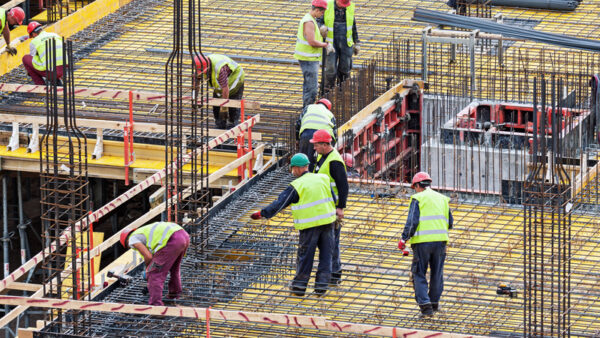Prompted by a Covid-19 outbreak that almost exclusively hit foreign workers in cramped dormitories, Singapore has unveiled plans to quickly overhaul migrant labour accommodation with a dramatic increase in personal space, access to toilet facilities and sick bays.
On the way to a new accommodation system, the government will require contractors to build temporary accommodation at their construction sites.
And Singaporeans have been urged not to have a “NIMBY” mindset as new dormitories are built closer to residential areas.
Within two years the government aims to build 11 new dorms for 100,000 workers that will have 10 beds per room, single stacked, down from current practice of around 16 bunks per room.
There will be one set of toilet facilities for every five beds instead of one for every 15 beds now.
And instead of one sick-bay bed for every thousand dorm beds, there will be 15.
It is a major step for the city state, whose reliance on foreign workers in the construction sector was uncomfortably laid bare in the coronavirus pandemic.
More than 90% of Singapore’s 35,292 Covid-19 cases have been among the migrant-worker population.
Most migrant workers in Singapore work in construction; their number is about 320,000, according to The Straits Times.
Unveiling plans for the new dorms on 1 June, National Development Minister Lawrence Wong said it was “not realistic” to expect this reliance to abate any time soon.
Before the new dorms are built, however, the government is taking action to cut the population density of current accommodation.
By the end of this year, new space for around 60,000 workers will be created in three separate initiatives.
It calls the first “Quick Build Dormitories” (QBDs), which are modular structures designed to last up to three years.
Eight sites for QBDs have been identified that together will house around 25,000 workers at a density of between 500 and 1,000 people per hectare.
Second, a further 25,000 workers will be housed in temporarily fitted-out state properties that are currently unused, including former schools and vacant factories.
And finally, contractors will be asked to build “Construction Temporary Quarters”, or CTQs, at their own work sites for around 10,000 workers, to cut down on commuting.
“We are still discussing with the contractors on the additional CTQs that they will need for their workers,” a statement issued jointly Monday by the ministries of National Development and Manpower said.Â
The statement urged the Singaporean public to accept more worker accommodation in their midst.
“Given our land constraints,” it read, “some dormitories will inevitably be located closer to residential areas. Singaporeans must therefore do our part too. We must reject the Not in My Backyard (NIMBY) mindset and instead appreciate these workers who keep Singapore going.”
The ministries added that they are studying the possibility of a new operating model for the provision of dormitories.
Now, commercial operators to bid to build and operate dorms on leased land.
“We are studying the options comprehensively and will share our findings in due course,” the statement said.
Image: The Westlite Toh Guan foreign-workers’ dormitory, Singapore (www.westlite.com.sg)
Further reading:










